John Moses Browning (JMB) is among the top gun designers in history.
Most gun designers often have one successful firearm to stake their name on.
Eugene Stoner has the M16, Mikhail Kalashnikov has the AK-47, John Pedersen has the Remington Model 51, but Browning was different.
His designs numbered in the dozens with many being exceptionally successful.
He built weapons that influenced the tactics and methods we still see to this day.
I started with a goal of writing about the 5 Best Browning designs, but couldn’t settle on just 5, so today you are getting 7 of John Browning’s greatest hits.
Best John Browning Firearms
1. Browning Hi-Power
The Browning Hi-Power is only number 7 because John Browning never finished the design.
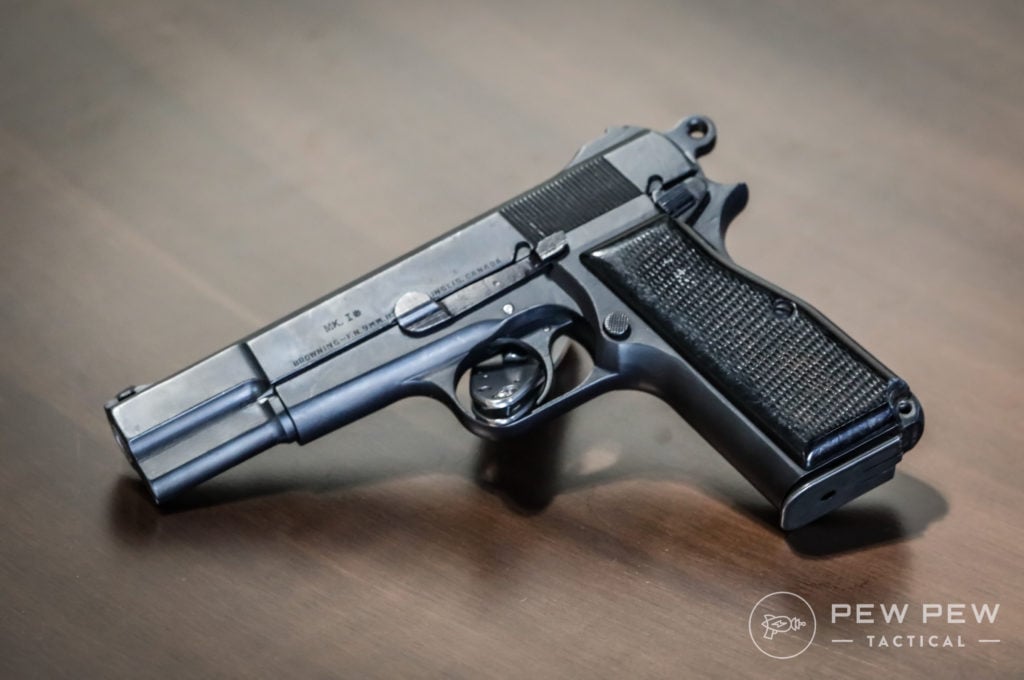
He died building it, and it was finished by Belgian firearms designer Dieudonne Saive. Saive also designed the FN FAL later in life.
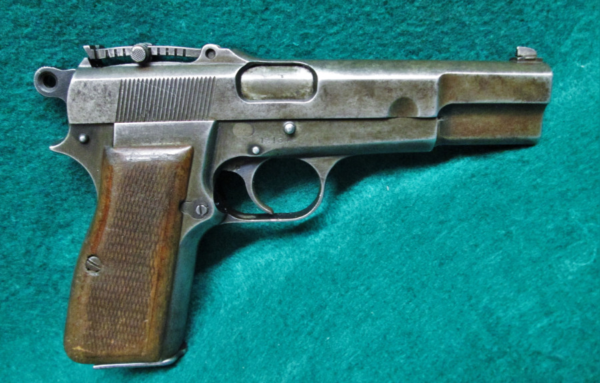
The Browning Hi-Power was the first wonder nine. A Wonder nine being a 9mm handgun that holds a large number of rounds in its double-stack magazine. The Hi-Power held 13 rounds in its magazine and at the time that was an impressive amount.
It utilizes short recoil operation, and was chambered in 9mm, 7.65×21, and later 40 S&W. The Browning Hi-Power was designed for a French military contract, but the French went with a different handgun.
However, as we now know the Hi-Power was not a failure.
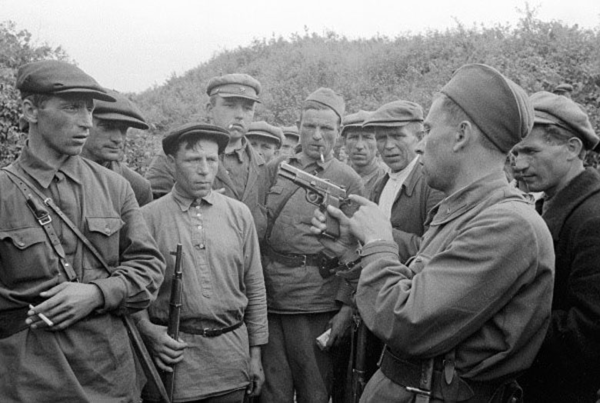
The Browning Hi-Power may not have attracted the United State’s interest, but more than 50 countries adopted the Browning Hi-Power as a military sidearm. This includes the United Kingdom, Canada, Austria, and at one point Nazi Germany.
To be clear, the factory was seized by Nazis and forced to produce them during Nazi occupation and FN did not do this by choice. The end result was opposing armies wielding the same handguns in WW2.
The Hi-Power was issued to the elite MACV-SOG units in Vietnam and to the FBI’s hostage rescue team. The Hi-Power remained popular across the middle-east as well as South America.
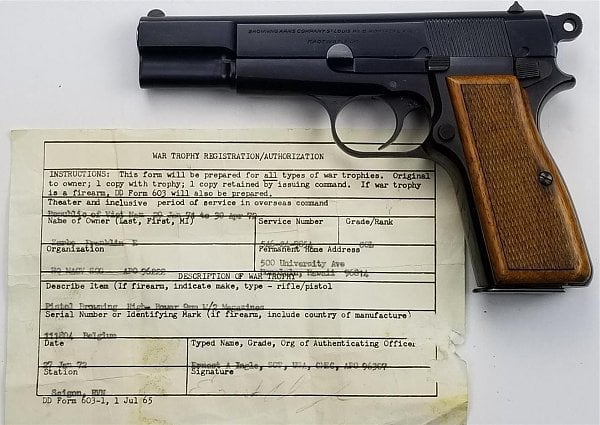
The gun itself remained in production up until 2017 by FN.
The FN Hi-Power is still produced under license in various parts of the world. To this day the Hi-Power is still used by police and military forces and is still an excellent fighting pistol. It’s easily one of the most influential handguns of all time.
Browning may not have finished the design, but it still deserves a place on this list.
Prices accurate at time of writing
Prices accurate at time of writing
-
25% off all OAKLEY products - OAKLEY25
Copied! Visit Merchant
2. Colt 1908 Pocket Hammerless
Throw a stick in a gun store and two things will happen. You’ll hit a pocket-sized .380 ACP handgun, and you’ll be asked to leave.
The .380 ACP was a niche cartridge for some time and made a major comeback as concealed carry permits soared. People wanted small, lightweight handguns, and the .380 ACP was perfect for that purpose.
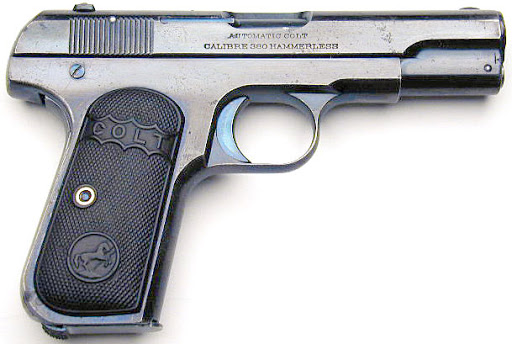
Way back when men were men, women were men, and children were also men, John Browning invented a 24-ounce pocket pistol. One design was known as the Colt Hammerless, originally the 1903 in .32 ACP.
5 years later we got the OG .380 ACP pistol, the Colt 1908 Pocket Hammerless.
These guns were produced for decades in various calibers but the 1908 makes the list because it was the first ‘pocket’ .380 ACP.
Prices accurate at time of writing
Prices accurate at time of writing
-
25% off all OAKLEY products - OAKLEY25
Copied! Visit Merchant
It was a rather large gun compared to modern .380s like the Ruger LCP, but small for the time. Pockets were also much bigger I’m assuming because this gun certainly wouldn’t fit in my Wranglers.
The .380 ACP Pocket hammerless model has 3.75 inch barrels, weighs a pound and a half, and contained 7 rounds of .380. These guns did have a hammer, it just happened to be concealed and hidden from view.
The idea was the gun could be drawn quickly and be snag-free. It was issued to Generals like Eisenhower and Patton and used by police and gangsters alike.
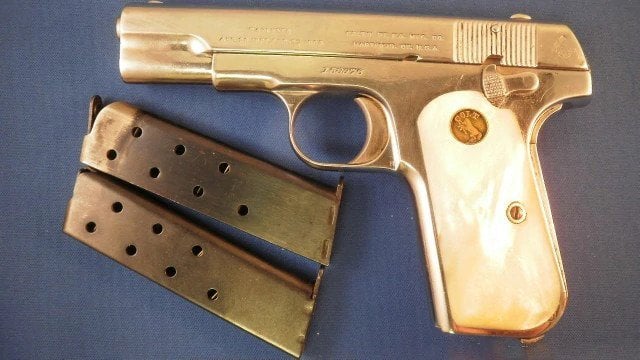
The 1908 Pocket Hammerless was the gun of choice for John Dillinger and he was killed with it when he reportedly reached in his pocket for it outside a theatre. Bonnie Parker used one to break Clyde out of jail, and Al Capone reportedly always had one on him.
The Colt Pocket Hammerless was one of the first pocket 380s and its influence is still seen today.
3. Browning Automatic Rifle
I love machine guns. I spent my USMC career as a machine gunner and always loved full-powered full autos.
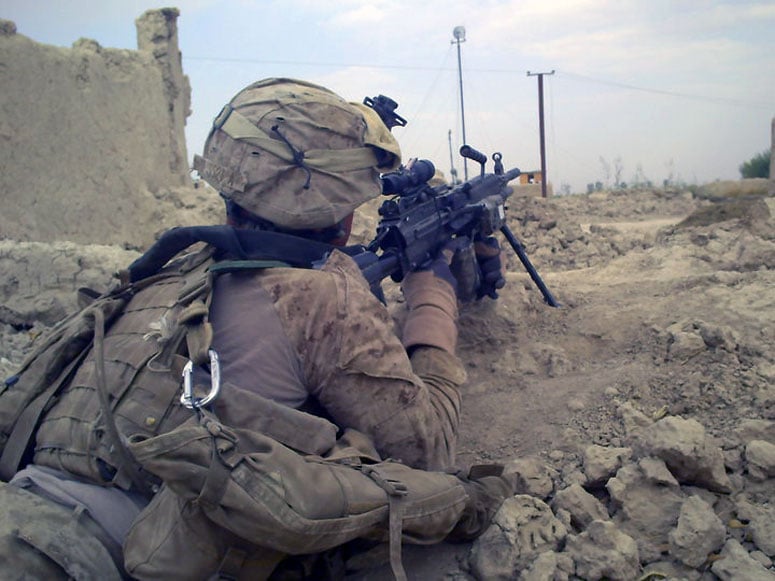
The Browning Automatic Rifle, or the BAR, was originally designed to be a ‘lightweight’ machine gun for trench warfare in WW1.
Keep in mind that back then machine guns had their own trailers to tote them around so the BAR was relatively light.
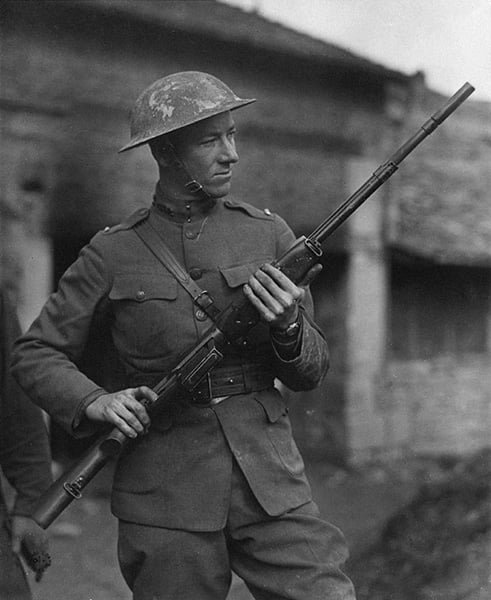
Other light machine guns like the Hotchkiss M1909 were prone to failure and broke easily. Let’s not even talk about the garbage can known as the Chauchat.
There was a need for a reliable machine gun that didn’t require a team to operate.
The BAR was the answer, but unfortunately showed up too late to make a difference in WW1, but like anything successful these days the sequel was imminent.
World War 2 was on the horizon and the Army quickly began to adopt the BAR.
This is the same concept used today with the new HK M27 IAR.
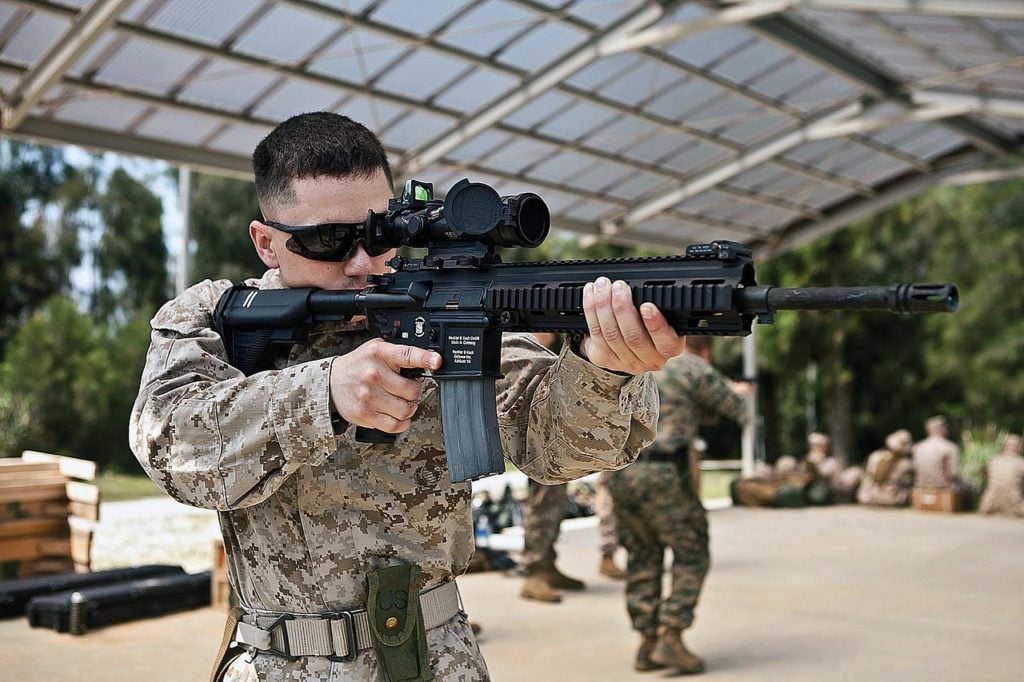
Prior to the adoption of the IAR the role was taken by the belt-fed M249 SAW.
The BAR influenced modern Marine tactics and helped birth the concept of the squad automatic weapon in US Doctrine for that reason it’s number 5.
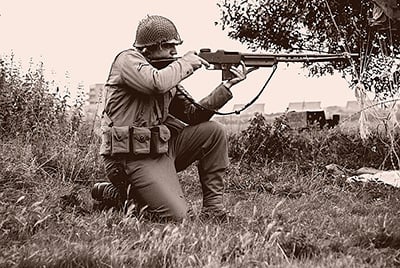
It was far from perfect, but it made its mark.
4. Winchester 1897
Branding is everything, and in the late 1800s the Winchester brand was all about lever actions.
While John Browning wanted to create a ‘slide’ or pump-action shotgun Winchester wanted a lever action so we got the Model 1887. The gun was big and somewhat clumsy and never took off.

Winchester came to their senses and allowed John Browning to design the 1893 Shotgun, the first pump-action shotgun. The 1893 was nice but had some flaws and the 1897 came along to fix those.
The Winchester 1897 has since become a legendary pump action shotgun.

The reason the gun is so famous isn’t just because it was the first successful pump action shotgun, but because of its use in World War 1.
Trench warfare turned out to be the perfect place for a shotgun, and the Winchester 1897 Trench gun was the perfect shotgun for the trenches.
The trench gun variant had a 20-inch cylinder bore barrel, a heat guard, and the ability to mount a flippin sword bayonet. The gun’s appearance is iconic and it’s the only pump gun I know with an exposed hammer.

The gun lacks a trigger disconnector and this means the user can hold down the trigger and the gun will fire every time the weapon is pumped.
This would allow a soldier to sweep a trench with buckshot, and allow for a solid foothold in the trench.
The Winchester 1897 became so famous and feared the Germans protested its use in World War 1. Yep, the country that created mustard gas and flamethrowers thought shotguns were a bit much.
The gun served throughout WW1, and later WW2 and Korea. It even saw action in Vietnam. The Winchester 1897 was a well made and well-designed pump action shotgun that also served hunters, trap shooters, and police forces for decades.
The Winchester 1897 makes the list for being iconic and for its service in the meat grinder of World War 1.
5. Browning Auto 5
It’s 2019 and some companies are still having issues making reliably cycling semi-auto shotguns *cough IWI TS12 cough*.
John Browning was able to create a reliable semi-auto shotgun in 1897 and the Browning Auto 5 started production in 1902 and according to Browning’s website ended in 1999.
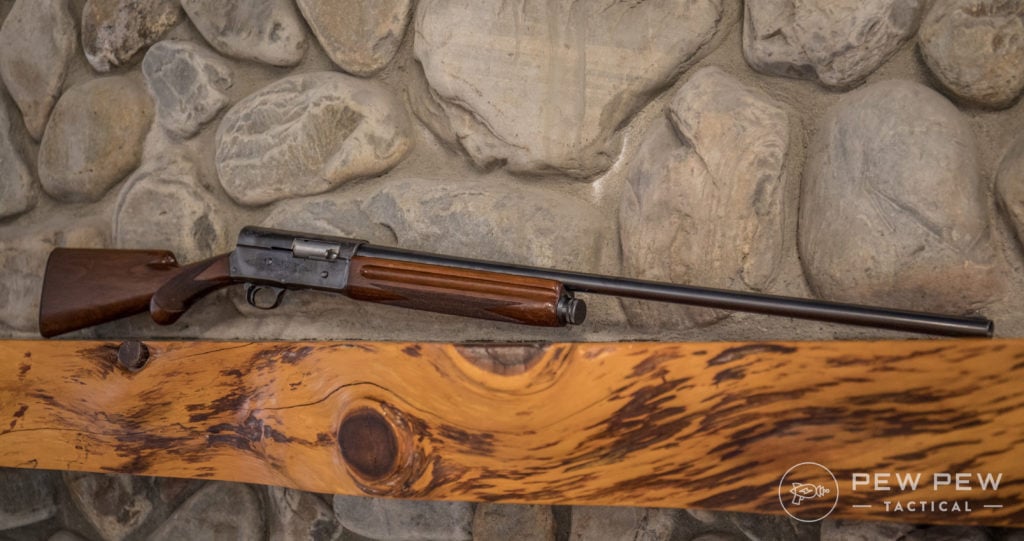
The Auto 5 became iconic due to its design which incorporates the famous Humpback receiver. The A5 is a recoil-operated shotgun that was produced in 12, 16, and 20 gauges. The A5 wasn’t the first semi-auto shotgun, but it was the first successful model.
The Browning Auto 5 was first presented to Winchester, and they couldn’t agree on a contract. Then to Remington but Remington’s President died, so Browning went overseas and FN seemed happy to produce it.
The Auto 5 was used by hunters, specifically bird hunters who wanted fast and reliable follow up shots. It also saw police and military service on a limited basis. The A5 was reportedly used in WW1 but it must have been in small numbers.
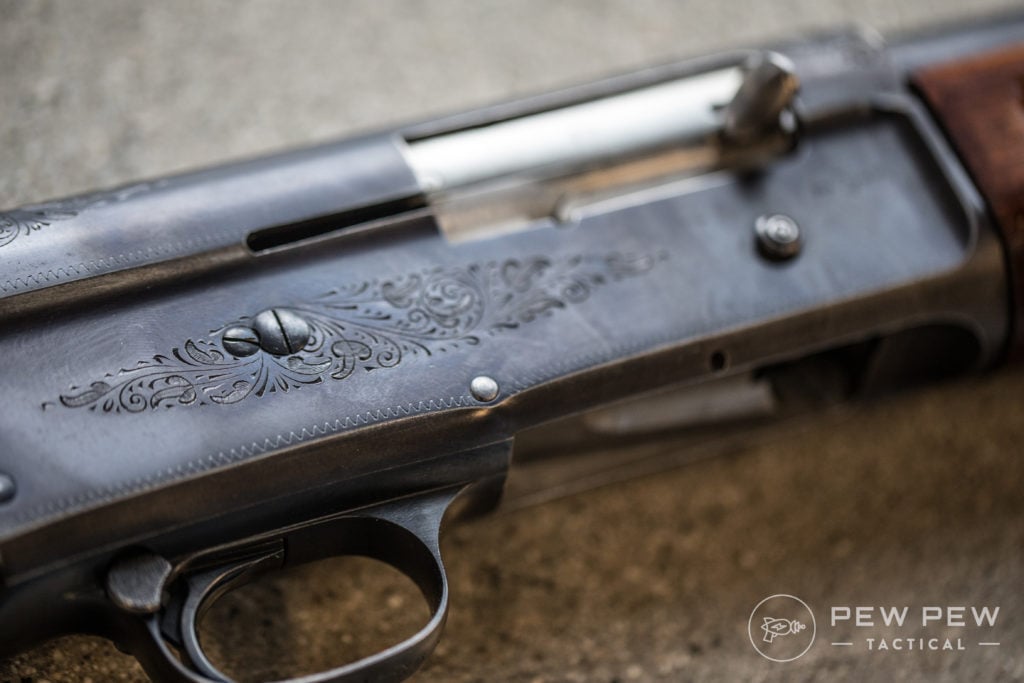
Pictures exist of the A5 with Doughboys, but FN may have been more concerned with producing traditional military arms to produce a ton of A5s for military use.
The Auto 5 was used again in WW2, as well as with European forces in Vietnam. The Rhodesians and South Africans used the A5 with an extended magazine tube, a shortened barrel, and a ton of wood that acted as a forend. Century apparently imported and sold these guns in the 1990s for a steal.
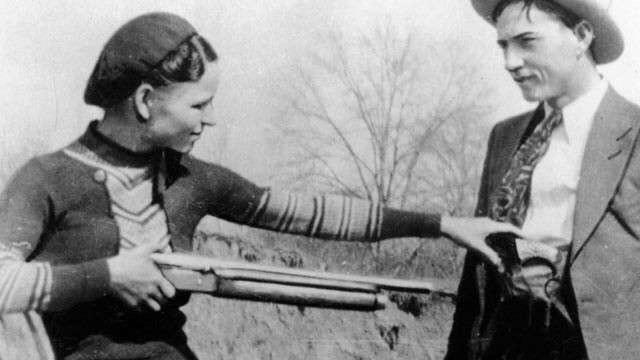
One of the coolest features is the magazine tube lockout lever. Flick it into place and you can load a single round into the ejection port. This makes slug crossover drills quick and easy.
The Auto 5 is a sweet-shooting shotgun and old A5s remain in service to this day with hunters and sportsmen. They were designed to last and they most certainly did. The A5 makes the list because I love shotguns and this was the first successful semi-auto we had.
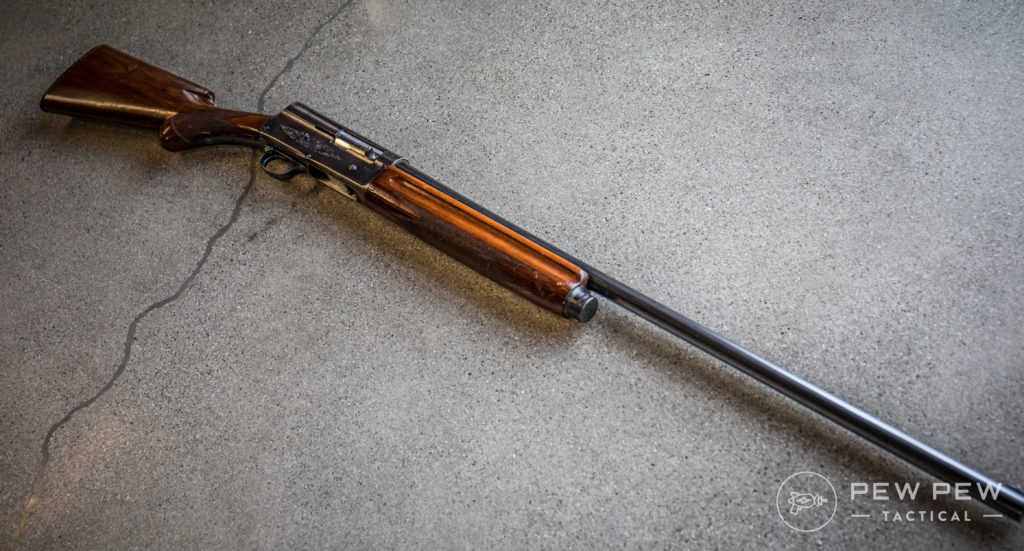
Not only that, but to this day these guns are used, abused, and beloved by their owners. The A5 has since influenced nearly every other semi-auto shotgun on the market.
Prices accurate at time of writing
Prices accurate at time of writing
-
25% off all OAKLEY products - OAKLEY25
Copied! Visit Merchant
6. M2 Machine Gun
The M2 Machine Gun, affectionately known as the Ma Deuce, is one of the earliest heavy machine guns. The M2 machine gun was first put into service in 1933 and remains there to this day.
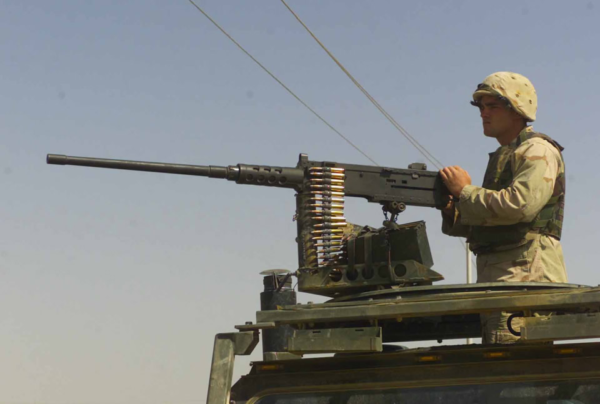
The .50 BMG machine gun is an incredibly powerful weapon that John Browning designed based off the earlier M1919 Browning machine gun.
In World War 1 we saw the first arrival of armored vehicles and larger than rifle calibers being developed to defeat them. This brought forth a demand for an anti-tank machine gun.
Back then tanks were essentially armored cars, so something like a .50 Cal can rip through them.
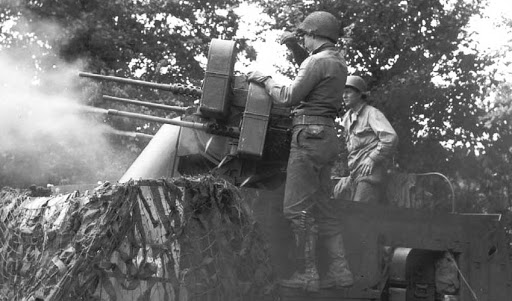
Browning designed both the gun and the round and the M2 has remained a staple of the US armed forces. The M2 has a max effective range of over a mile and depending on the model has a cyclic rate between 450 to 1,300 rounds a minute.
The Marine Corps splits their infantry forces into multiple job fields and each field has their own school at the School of Infantry.
While in Machine Gun School I fell into a love/hate relationship with the M2 Machine Gun. The love comes from the fact the M2 will destroy almost anything you put in front of it.
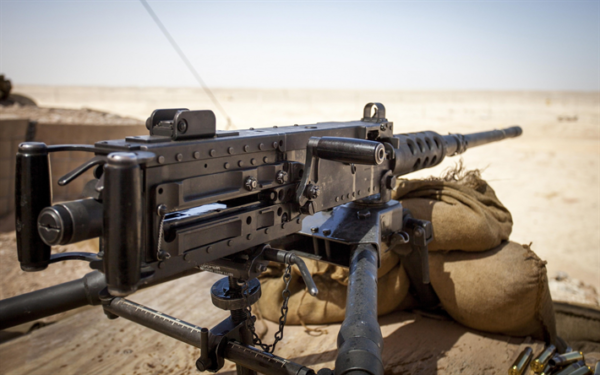
It will punch through most cover and in infantry operations the ability to rip through what most ground troops consider cover is invaluable.
Let’s not forget that being able to reach out and touch vehicular targets up to a mile away can be immensely comforting.
The M2 is an infantryman’s security blanket.
My personal hate is from the complication of the machine. It’s got parts that are as big as a hammer and some smaller than a penny. Taking it apart and putting it back together in under 3 minutes was a challenge.
Also, it weighs over a hundred pounds with the tripod and humping it isn’t much fun at all.
The M2 operates from a closed bolt and uses short recoil. It’s an exceptionally accurate gun, and the standard M2HB’s slow firing rate makes it easy to control.
Carlos Hathcock famously used the M2 with an optic to hit man-sized targets at beyond a mile.
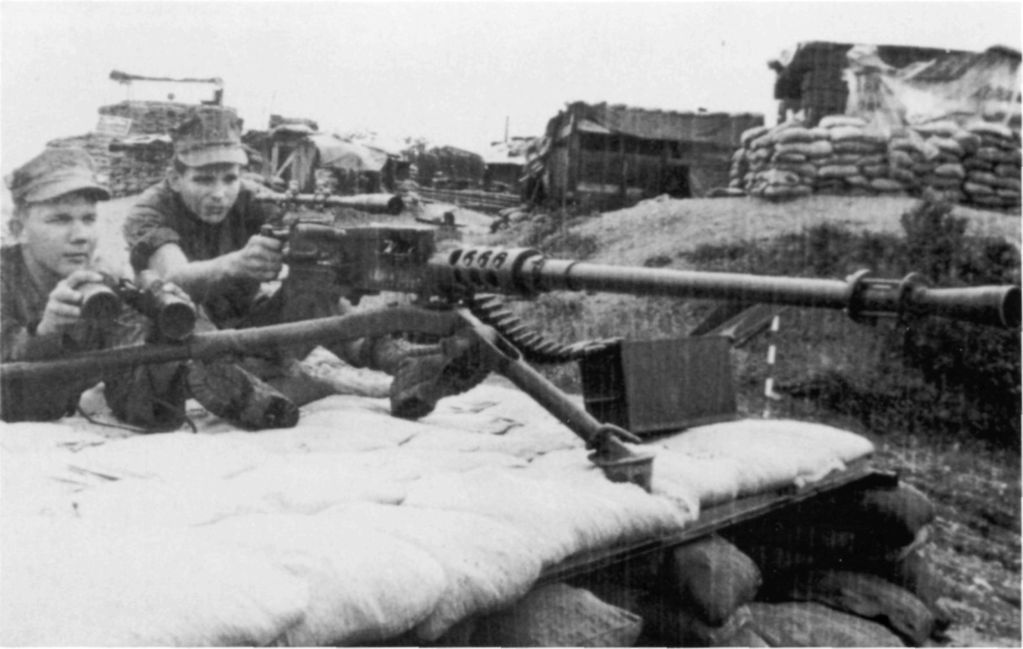
The M2 is a unique machine gun that’s immensely powerful and it’s long and the expansive service life is a testament to Browning’s genius.
7. 1911
Did anyone have any doubt this gun would be number 1 on the list? I don’t even think the 1911 is all that these days, but even I own four of them. The 1911 is certainly Browning’s most famous gun.
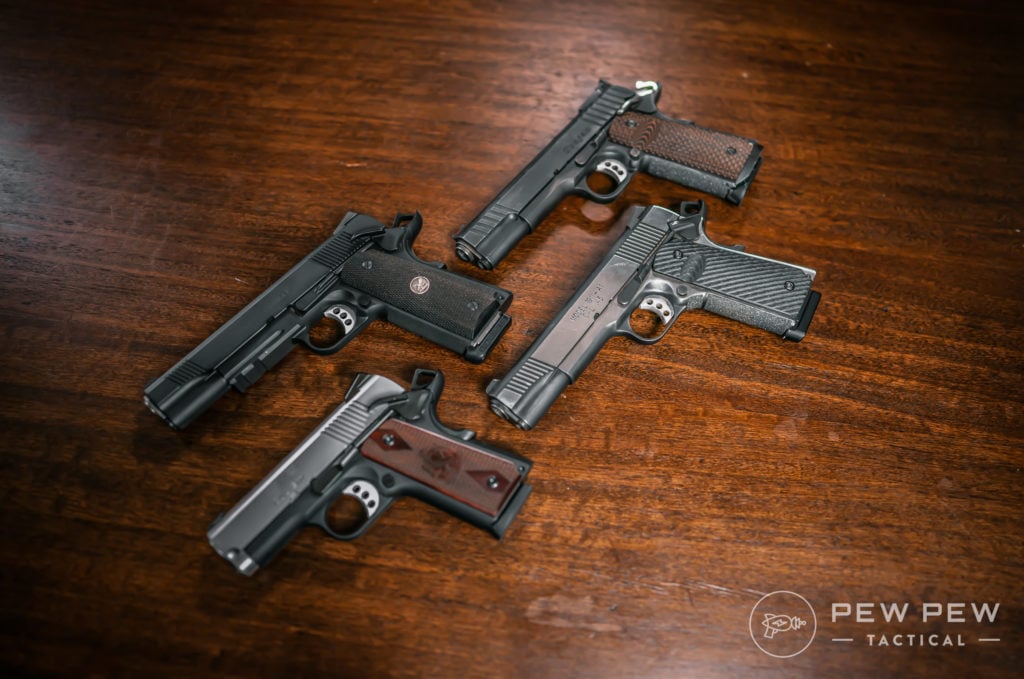
The 1911 and its .45 ACP cartridges are both designed by John Browning. The 1911 uses Browning’s short recoil principle and is a single action, single stack design.
The 1911 was the first automatic handgun adopted by the United States military and it served from 1911 to 1986 as a general issue sidearm. It continued to serve in a special operations role for much longer.
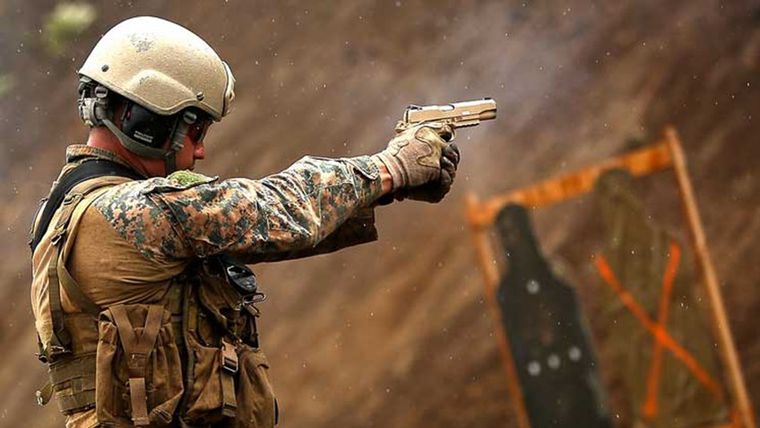
The 1911 then went on to serve with police forces, security companies, and criminals.
The gun is beloved by American shooters and has been produced by hundreds of companies from high end custom designers to budget based brands. The 1911 has changed over time and become a more effective firearm.
These changes have made the gun more reliable, easy to shoot, and ultimately more effective.
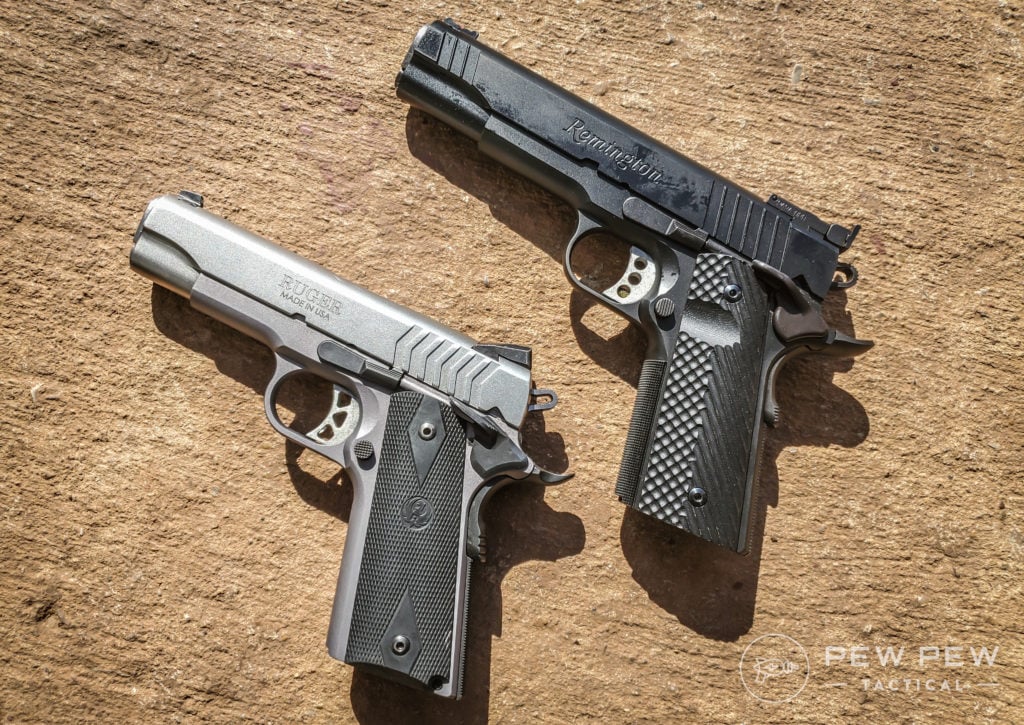
With such a massive market for the pistol you can find one for as little as 400 bucks and for as much as 4,000 bucks. They come in just about every size and pistol caliber you can imagine.
From the standard .45 ACP to 10mm, 9mm, .380 ACP, .38 Super, and really too many to list here.
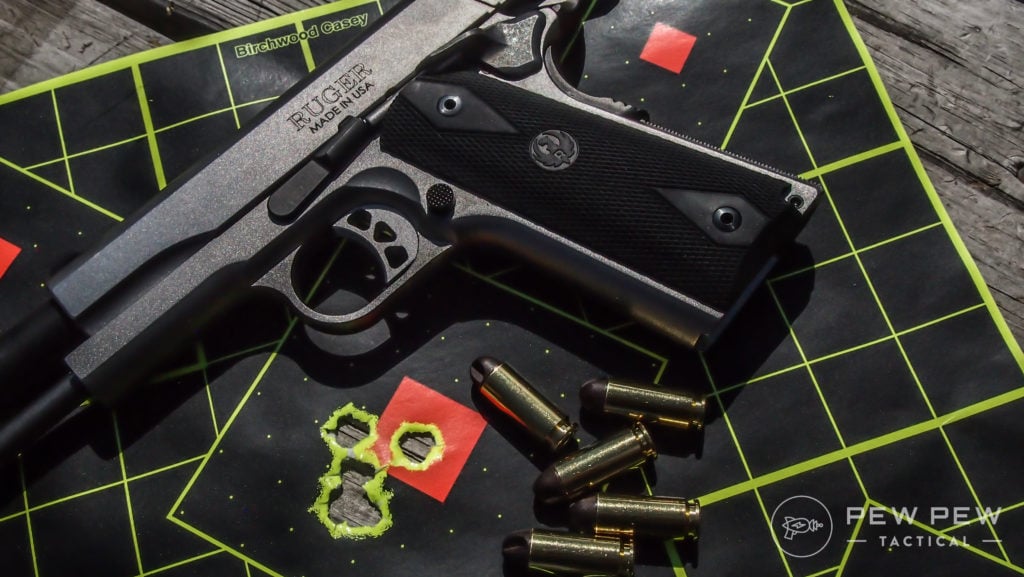
After all this time America still cannot get enough of the 1911 and John Browning should be immensely proud of the weapon he created.
It joins weapons like the Brown Bess, the Gatling gun, the Colt Peacemaker, and the M16 as some of the most influential and well used firearms of all time.
Check out our list of the Best 1911s for the Money.
The Browning Effect
John Moses Browning was a fascinating man. Sometimes things line up just perfectly in this world and we get men like Browning.
He was a genius born the son of a gunsmith. He went on to create dozens of firearms and cartridges that changed the world.
His guns have had a lasting effect on the world and they’ve proven to designs that last as well. Browning’s biggest limitations were materials and the technology of his time.
I could only imagine what Browning would be capable of creating with today’s technology and materials.
What is YOUR favorite Browning designed firearm? Let us know in the comments! For some more awesome history making guns, take a look at the Best Historical Guns (That You Can Still Buy)!

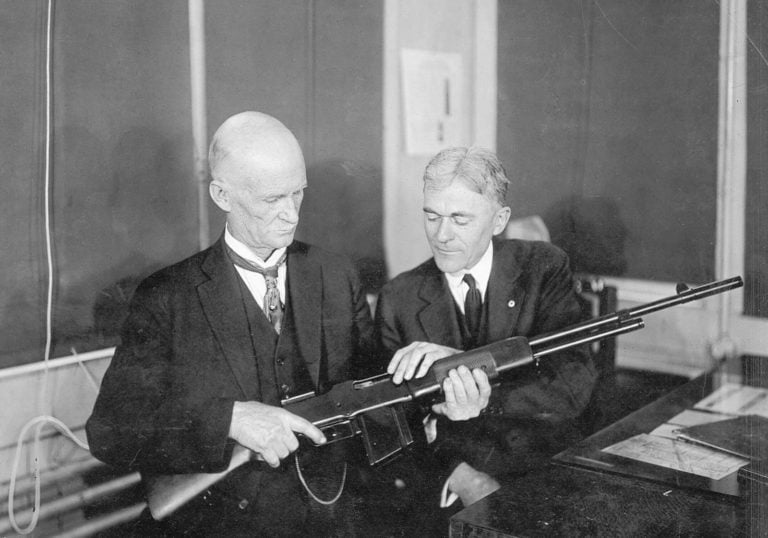
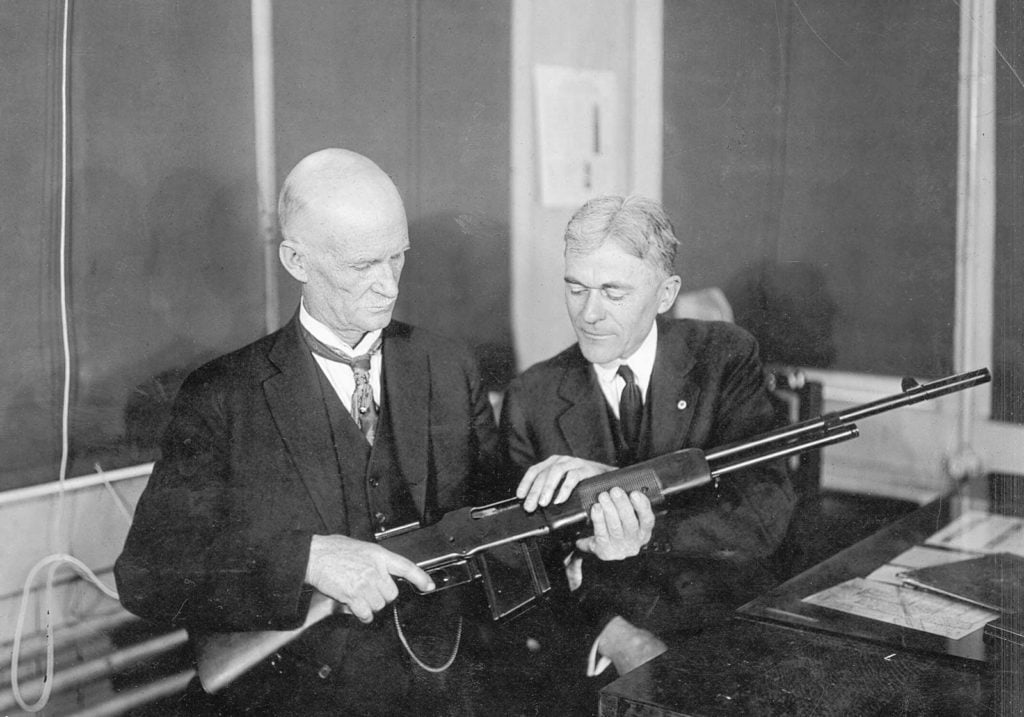







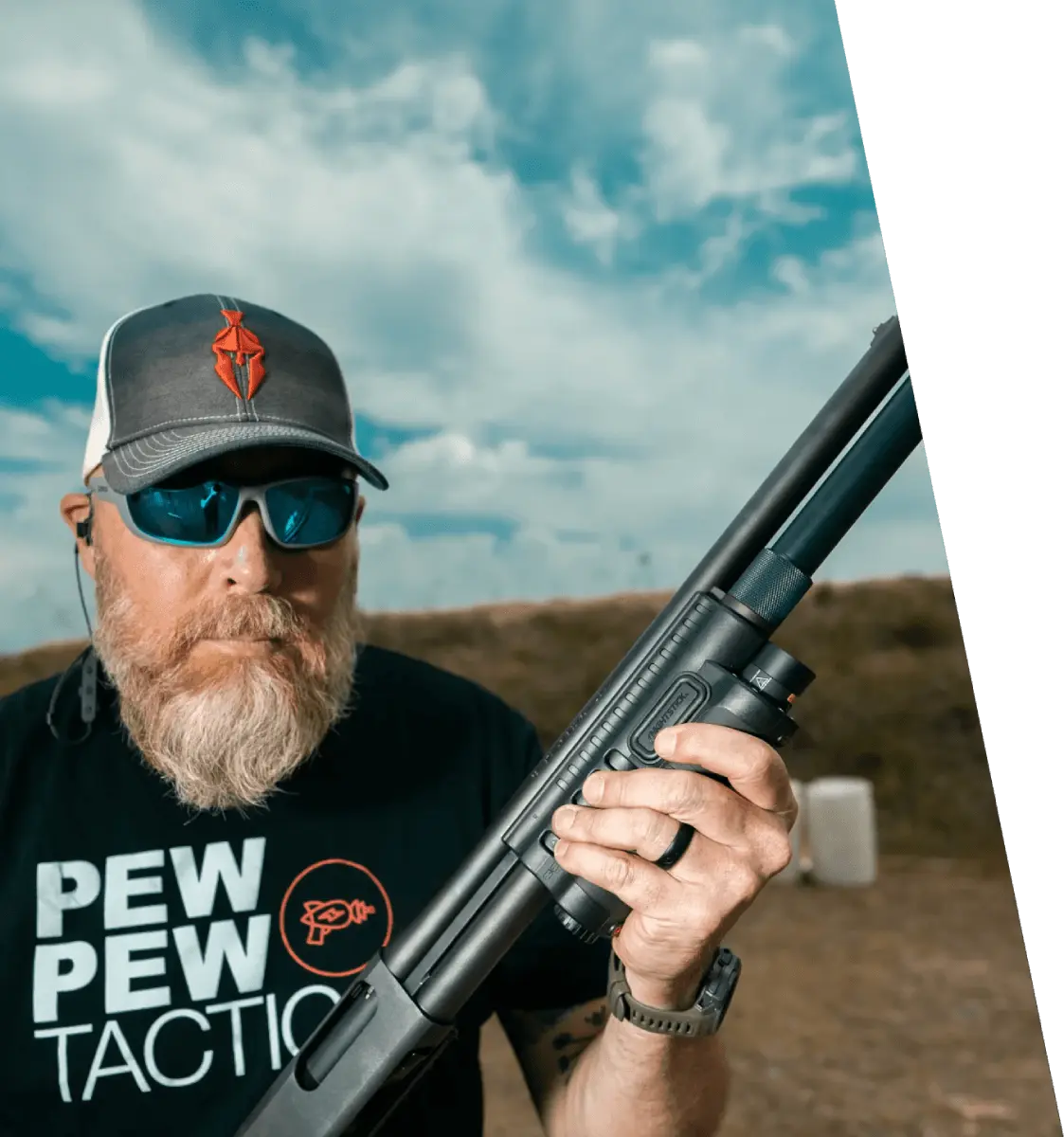

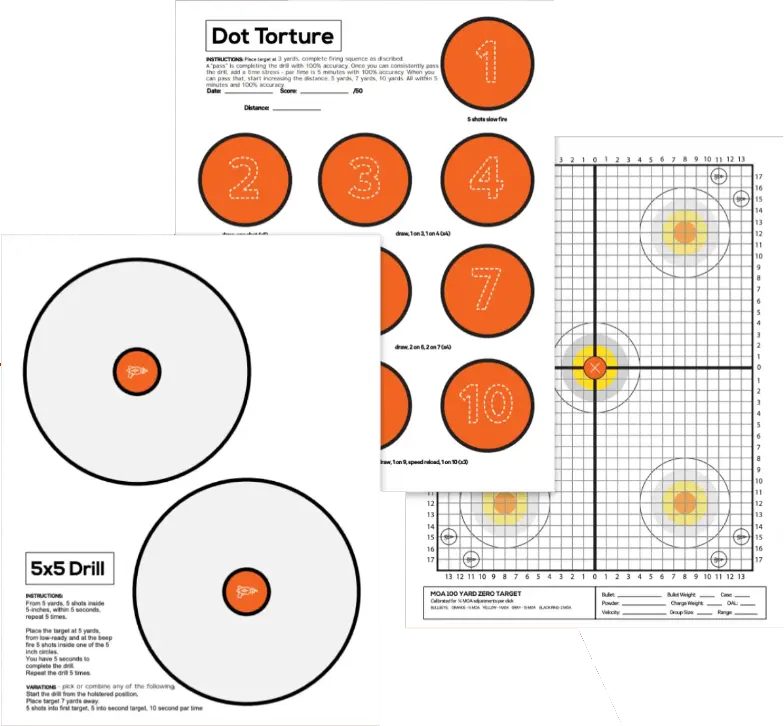
3 Leave a Reply
I like my A5 the best
What about the Superposed (aka lightning). Probably the best over under shotgun ever designed. Not the citori, which is at best a copy or the original. I have 2 and have run countless shots of clays through it between my grandfather, father and me. Definitely a family heirloom for my nephew
Uh... no mention of the 1892 Winchester or 1886 Winchester?